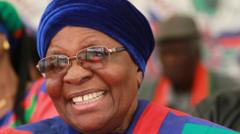Nandi-Ndaitwah's victory not only marks a significant milestone for women in leadership but also continues her legacy as a determined activist and prominent political figure in Namibia's history.
From Freedom Fighter to Historic Leader: Netumbo Nandi-Ndaitwah Becomes Namibia's First Female President

From Freedom Fighter to Historic Leader: Netumbo Nandi-Ndaitwah Becomes Namibia's First Female President
Namibia has made a monumental leap in its political landscape with the election of Netumbo Nandi-Ndaitwah as its first female president.
In a historic election, Netumbo Nandi-Ndaitwah, affectionately known as NNN, has been elected as Namibia's first female president, securing over 57% of the vote. At 72, she has emerged as a pivotal figure in Namibian politics, following a life enriched with activism and resilience. Her closest competitor, Panduleni Itula, who received 26% of the votes, has since contested the election results, labeling them as "deeply flawed" amidst claims of logistical issues and extended polling periods. His Independent Patriots for Change (IPC) party plans to take the matter to court.
Nandi-Ndaitwah's political journey began in her teenage years when she became a dedicated member of the Swapo party, which fought against South Africa's occupation of Namibia. Born in 1952 in Onamutai, she faced adversity early, being arrested during anti-colonial activities while still in high school. This led to her exile in Zambia and Tanzania, where she remained pivotal in organizing against colonial rule before completing her education in the UK.
Following Namibia's independence in 1988, Nandi-Ndaitwah returned to contribute to the burgeoning nation. Over time, she has held various ministerial roles, demonstrating her commitment not only to national governance but also to women's rights. A standout achievement includes her influential role in passing the Combating of Domestic Violence Act in 2002, advocating for gender equality amidst Namibia's male-dominated political framework. Earlier this year, she rose to the role of vice-president following the passing of former President Hage Geingob.
With a hands-on leadership style, Nandi-Ndaitwah has emphasized action over rhetoric, stating, "I am an implementer, not a storyteller." She is married to Epaphras Denga Ndaitwah, former chief of Namibia's defence forces, and they have three sons together. As Namibia looks towards the future, Nandi-Ndaitwah pledges to spearhead economic transformation and continue her advocacy for women's rights within the political sphere.
Nandi-Ndaitwah's political journey began in her teenage years when she became a dedicated member of the Swapo party, which fought against South Africa's occupation of Namibia. Born in 1952 in Onamutai, she faced adversity early, being arrested during anti-colonial activities while still in high school. This led to her exile in Zambia and Tanzania, where she remained pivotal in organizing against colonial rule before completing her education in the UK.
Following Namibia's independence in 1988, Nandi-Ndaitwah returned to contribute to the burgeoning nation. Over time, she has held various ministerial roles, demonstrating her commitment not only to national governance but also to women's rights. A standout achievement includes her influential role in passing the Combating of Domestic Violence Act in 2002, advocating for gender equality amidst Namibia's male-dominated political framework. Earlier this year, she rose to the role of vice-president following the passing of former President Hage Geingob.
With a hands-on leadership style, Nandi-Ndaitwah has emphasized action over rhetoric, stating, "I am an implementer, not a storyteller." She is married to Epaphras Denga Ndaitwah, former chief of Namibia's defence forces, and they have three sons together. As Namibia looks towards the future, Nandi-Ndaitwah pledges to spearhead economic transformation and continue her advocacy for women's rights within the political sphere.




















